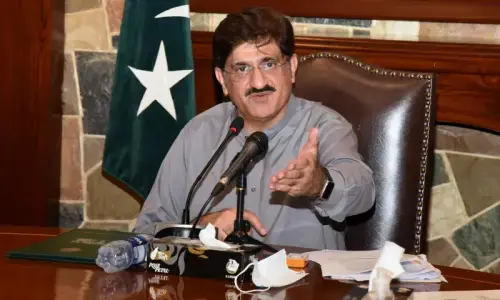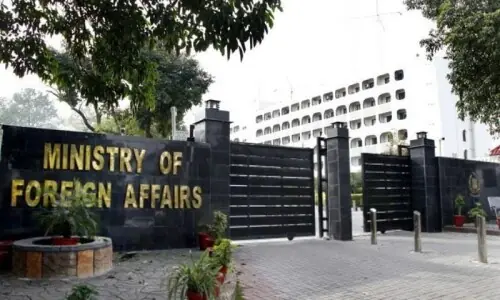
GHALIB is one of our literary colossi who have fascinated our critics and researchers for quite long. It began with Altaf Hussain Hali’s Yadgar-i-Ghalib (1897) and ever since then hundreds of books and as many articles, maybe more, have been written on Ghalib’s life, poetry and his other literary works.
Right from Maulvi Mahesh Prashad and Ghulam Rasool Mehr to Imtiaz Ali Khan Arshi and Qazi Abdul Wadood, some of our finest literary minds have devoted their time and labour to unfolding the mystery that Ghalib was. In our times, too, Ghalib has hooked some of our renowned critics and scholars, such as Syed Qudrat Naqvi. Editing and critically evaluating Gul-i-r’ana and Nuskha-i-Sherani, two rare manuscripts of Ghalib’s Urdu divan, are among the remarkable research works that Qudrat Naqvi carried out on Ghalib.
Gul-i-r’ana is the first selection of Ghalib’s Urdu and Persian poetry. Ghalib himself had selected and compiled his Persian and Urdu verses in a volume named Gul-i-r’ana in Rabiul Awwal 1244 Hijri/September 1828 AD, while he was in Calcutta (now Kolkata), though it could not be published in Ghalib’s lifetime. It was Hasrat Mohani who first mentioned in his Sharh-i-divan-i-Ghalib the fact that Gul-i-r’ana included many verses that the latter-day divans of Ghalib did not have. Gul-i-r’ana finally appeared in print in 1970, or 101 years after Ghalib’s death and 142 years after its compilation.
Ghalib’s death centenary, commemorated internationally in 1969, sparked a renewed interest in Ghalib. Malik Ram, the well-known researcher and an expert on Ghalib, edited and published from Delhi a manuscript of Gul-i-r’ana in 1970. Dr Moin-ur-Rahman discovered two more manuscripts of Gul-i-r’ana in Lahore, one of them handwritten by Ghalib himself. Yet another manuscript of Gul-i-r’ana was edited and published by Syed Vazeer-ul-Hasan Abidi the same year.
Mushfiq Khwaja discovered, from the personal collection of Syed Vasi Ahmed Bilgrami, another manuscript of Gul-i-r’ana and asked Syed Qudrat Naqvi to edit it. Its publication began in parts in Urdu, the research journal of Anjuman Taraqqi-i-Urdu, from 1971. Later, it was published in book form with the facsimile of the manuscript.
Qudrat Naqvi worked meticulously on this manuscript, discussing the text in a detailed preface and expounding it with erudite annotations. He concluded that the manuscript found in Bilgrami’s collection was the most complete one as it had some additional text, which Malik Ram’s manuscript and one of Lahore’s manuscripts did not include.
Coming to Nuskha-i-Sherani, it is a manuscript of divan of Ghalib that Hafiz Mahmood Sherani owned and was purchased by Punjab University in 1942. It is a divan that does not include many of Ghalib’s verses as he had decided to discard many of his couplets. Though it is not known exactly when Ghalib compiled Nuskha-i-Sherani, most scholars agree that Ghalib began compiling his own divan, later dubbed as Nuskha-i-Sherani, in October 1821 and finished it in April 1826. Divan of Ghalib compiled by Imtiaz Ali Khan Arshi and known as Nuskha-i-Arshi is generally considered the most authentic version of divan of Ghalib and is based mostly on Nuskha-i-Sherani.
Majlis-i-Taraqqi-i-Adab, Lahore, had published facsimile of Nuskha-i-Sherani and some scholars such as Imtiaz Ali Khan Arshi, Qazi Abdul Wadood and Dr Waheed Qureshi had analysed Nuskha-i-Sherani. But many aspects of this divan were yet to be discovered and discussed. So Qudrat Naqvi wrote a 400-page research work and drew some important conclusions. He said, for example, that contrary to the common belief Nuskha-i-Sherani is not based on Nuskha-i-Hameediya or Nuskha-i-Bhopal, a manuscript penned in 1821. Also, the compiler or the calligrapher of Nuskha-i-Hameediya had made many mistakes, some of which have crept into Nuskha-i-Arshi as well.
Another of Qudrat Naqvi’s works on Ghalib is the editing of Hangama-i-dil ashob. When Ghalib criticised Burhan-i-qaat’e, a famous Persian dictionary, a series of works both in prose and poem appeared, some favouring Ghalib and some criticising him. These writings were collected in a volume in 1867. It was reprinted in a 1937 issue of research journal Urdu, but the text was mutilated due to some calligraphic errors. Qudrat Naqvi corrected the text and wrote annotations. The book was published by Anjuman Taraqqi-i-Urdu in 1969. These works and some other research and critical works on Ghalib made Qudrat Naqvi a critic to reckon with and he was recognised as a scholar of Ghalib, as well as a lexicographer and linguist.
Born Syed Shuja’at Ali Naqvi Al-Bukhari in Abdullahpur, district of Meruth (also spelt Meerut), on Nov 10, 1925, Qudrat Naqvi was a linguist, lexicographer, critic, research scholar and poet. Having passed his matriculation from Allahabad Board, he obtained a certificate in Persian from Meruth and a degree in Oriental Studies from Punjab Board. After independence, he migrated to Pakistan and stayed in Lahore. Later, he moved to Multan and taught there for quite some time in different educational institutions. Considering his research work and special aptitude for languages and lexicography, Shan-ul-Haq Haqqee invited him to join Urdu Development Board, later named Urdu Dictionary Board (UDB). Qudrat Naqvi joined UDB in 1969 and rose to the position of editor, rendering invaluable services for the compilation of the board’s monumental 22-volume dictionary.
Some of Qudrat Naqvi’s other books are Ghalib kaun hai, Asaas-i-Urdu, Ghalib-i-sad rang, Seerat-un-Nabi, Hindi-Urdu lughat, Mutal’a-i-Abdul Haq, Lisani maqalaat, and Maqalaat-i-Qudrat Naqvi.
Syed Qudrat Naqvi died in Karachi on Dec 16, 2000.
Published in Dawn, December 12th, 2017
































